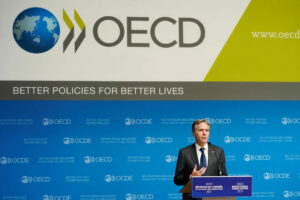By Kenneth Christiane L. Basilio, Reporter
THE GOVERNMENT may need to rethink its reliance on tax incentives for attracting investment with the onset of global minimum tax rules, the Congressional policy think tank said.
The Philippines should also take note of regional neighbors that have adopted the global minimum tax while remaining attractive to foreign companies, the Congressional Policy and Budget Research Department (CPBRD) said.
It cited “non-tax investment drivers such as general operating conditions, strong infrastructure, availability of skilled workers, access to talent, and ease of doing business” as a means of remaining competitive in a minimum-tax scenario, the author of the CPBRD report, Jhoanne Estipular Aquino, said.
“These measures have been viewed to deliver more sustainable, long-term value to investors,” she added.
The Philippines is a party to the Base Erosion and Profit Shifting (BEPS) program of the Organisation for Economic Cooperation and Development (OECD). BEPS seeks to deter tax avoidance by multinational companies, who typically shop around the various jurisdictions to optimize their tax bills. Signed by more than 100 nations, it included a proposal to introduce a 15% global minimum tax.
Multinational enterprises with global revenue exceeding 750 million euros in two of the four preceding fiscal years could be required to pay a 15% minimum effective tax regardless of where they operate, according to OECD’s Pillar Two program. Any savings from low-tax jurisdictions will need to be offset with a “top-up” tax to bring their effective rate to 15%.
The Philippines has made some progress towards adopting a global minimum tax, according to the CPBRD, referring to the Corporate Recovery and Tax Incentives for Enterprises (CREATE) Act and Corporate Recovery and Tax Incentives for Enterprises to Maximize Opportunities for Reinvigorating the Economy (CREATE MORE) Act.
“While the recently enacted CREATE MORE law in 2024 does not explicitly state the implementation of a global minimum tax, it has set the stage for future legislation by aligning the tax system with BEPS principles and general rules governing global minimum tax,” according to the paper.
A global minimum tax could reduce the appeal of fiscal incentives for multinational companies considering setting up shop in the Philippines, according to the report.
“Note that the Philippines is home to many enterprises in manufacturing, business process outsourcing, and renewable energy, which benefit from income tax holidays or special income tax rates,” it said.
“As such, the companies that are currently enjoying these existing tax incentives will still have to pay top-up taxes if their effective tax rate falls below 15%, likely affecting their future investment decisions,” it added.
The think tank said the government could explore other forms of incentives to remain a viable destination for foreign multinationals, including expenditure-based perks.
The government could also offer cash grants and refundable tax credits, similar to those being planned by Malaysia and Vietnam, the CPBRD said.
“Other alternatives include non-tax incentives, interest-free loans, and relaxed ownership restrictions. The Philippines could adopt similar approaches tailored to the government’s specific investment policies,” it said.

